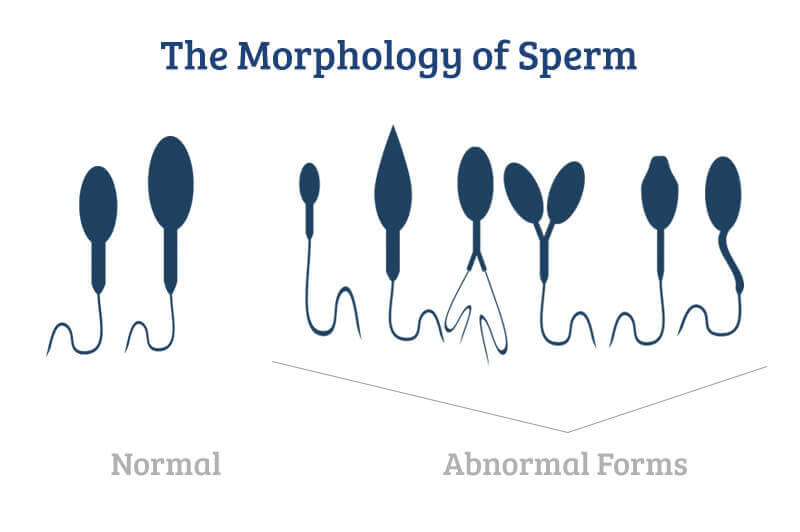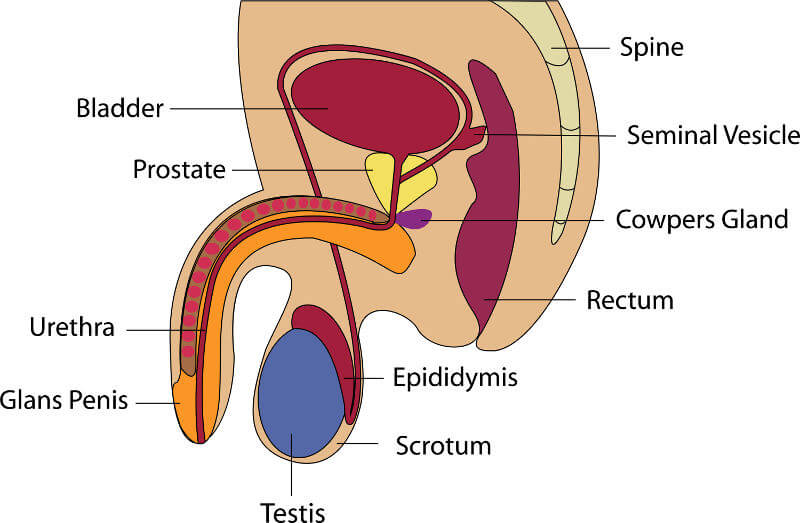50% of the Time, Infertility Is a Man's Problem [Here's Why]





Male Infertility: Incidence, Causes, Treatments and Options for Affected Couples
For most aspects of our health and wellbeing, it is ourselves only who matter; if we are ill or have an injury we seek medical help individually to resolve the problem. In this respect, fertility (and its nemesis, infertility) is quite unique, because it involves two people of the opposite sex, not just one or the other. Therefore, when a couple are trying for a pregnancy and nothing is happening, both partners in the couple need to be investigated or counseled. If the couple are experiencing involuntary infertility (i.e. no conception after 12-18 months or more of unprotected intercourse), then it may be the man or the woman, or both, who have a problem that is responsible.
This article deals specifically with male infertility, but because infertility is a couple issue, it has to take some account also of the female partner because she is the other essential half of the fertility equation.
Incidence and causes of male infertility
Approximately 1 in 7 couples will experience fertility problems and 'male factor' is identified as a potential cause in over one third of cases, and perhaps in a half of cases. The problem may be too low a sperm count, poor quality of the sperm, or both together. It is worth pointing out that even in a normally fertile man, the majority of sperm produced can be classified as being 'abnormal' because of shape, structural defects or motility (swimming) defects. In most domestic animals/livestock, this is not the case and at least 90% of sperm would be classed as normal. So the overall quality of sperm produced by men borders on 'atrocious' by animal breeding standards. I mention this because it implies that we are naturally subfertile as a species, in comparison to most animals, and this may be due in large part to the poor quality of sperm produced by all men. One consequence is that this may predispose men to infertility, because any additional insult to sperm production, whether through our genes, our lifestyle or other factors (see below for details), may easily tip a male to becoming infertile.
we are naturally subfertile as a species, in comparison to most animals, and this may be due in large part to the poor quality of sperm produced by all men

What causes male infertility?
The short answer is that we do not have any explanation of the cause in the majority of infertile men. Genetic defects explain some cases, illness or problems with development of the testicles also explain some cases, but these are in the minority. For most cases we do not have a clear explanation, so the infertility is termed 'idiopathic'. It is partly because of our ignorance about causes that we have few, if any, treatments for male infertility.
Basic facts about male fertility
Unlike women who have a monthly cycle that tells them something about their potential fertility, men have no such guide. An ejaculate containing no sperm usually looks no different than one containing 300 million sperm.
An ejaculate containing no sperm usually looks no different than one containing 300 million sperm
If a man produces no sperm, he will be infertile. That is perhaps one of the few certainties in the area of male fertility/infertility. Conversely, if a man produces normal numbers of sperm (approx. 100 million/day) and they are normal in shape and have good motility (so they can swim up the female reproductive tract), it is highly likely that he will be fertile. In between these two extremes, there is a world of considerable uncertainty which can be difficult for couples to negotiate when they are trying to find out 'is it him or is it her' when they are experiencing difficulty in achieving a pregnancy. What follows below is a guide that sets out what is normal, and abnormal, for a man in terms of his sperm count, motility etc, and then provides a guide as to what men, or couples, can do to ensure the best chances of fertility. In doing so, I need to be honest up-front by saying that there are very few factors known that can significantly change a man's sperm count or sperm quality for the better. Furthermore, medical treatments for men with a low sperm count or poor sperm quality are almost non-existent and lag far behind what is available for women with fertility problems.
Importance of sperm count - and what can affect it
Although it only takes a single sperm to fertilize the female egg (oocyte), making this happen naturally (within the female reproductive tract) requires much, much bigger numbers of sperm. In studies of couples trying for a pregnancy for the first time, it has been found that having a sperm count of at least 40 million per ml of ejaculate gives a maximum chance of conception. If sperm count is lower than this, and this is the case in over one third of young men, then it may take them longer to get their partner pregnant. As sperm counts get even lower, for example down to 10 million per ml, then the time taken to achieve a pregnancy may be even longer - or it may not happen at all. Although this may mean that the man is 'infertile', account also needs to be taken of the female partner. If she has her own fertility problems (eg abnormal menstrual cycles) this may be the explanation for the failure to conceive, or it may be a combination of her and his problems. It should also be remembered that even men with very low sperm counts may achieve a pregnancy in time - so an important take-home message is to never stop trying.
having a sperm count of at least 40 million per ml of ejaculate gives a maximum chance of conception
Bearing in mind the fundamental importance of sperm count, an obvious question that arises for couples is 'how can the man ensure he has a high sperm count, or if it's low, get it higher?'
What factors can affect sperm count?
Sperm count is very much about supply and demand - the more frequently a man ejaculates, the lower his sperm count will become. This is because men, unlike most animals, do not store sperm, and the process of sperm production (10 weeks to make each sperm) cannot be speeded up. Therefore if the rate of shedding sperm (via ejaculation) exceeds the inflow of new sperm, then sperm count in the ejaculate will go down. This is why men are asked to abstain from ejaculating for 2 days before having their sperm count measured.
One question arising from this is whether it is a good idea for a man to refrain from ejaculating for some time - for example a week - before having intercourse, so that his sperm count is higher and thus the chances of impregnating his partner will be higher? This might help, but sometimes abstaining for too long can result in the accumulating sperm becoming damaged, which would hinder chances of conception rather than improving it. Moderation is perhaps the best guide - so refraining from ejaculation for 2-3 days (bearable for most men) prior to intercourse - but the most important thing is to time intercourse so that it will coincide with the timing of ovulation, or just precede it, because fertilization of the egg is not going to happen at any other time of the month. So the couple need to develop 'a strategic plan' that determines/predicts when her most fertile time will be (2-3 days around the middle of her monthly cycle) and then aim to have sex several times around that period but for the man to abstain for 2-3 days beforehand. This has the drawback of making the sex organized and somewhat mechanical, rather than romantic and spontaneous, but if it results in a pregnancy then it is a small price to pay.
What if I have a low sperm count?
No man will know what his sperm count is unless he has it checked by a specialist doctor, and this is not done until there is a suspicion of infertility; this would only be considered if a couple have been having regular unprotected sex for 12-18 months or more without any sign of a pregnancy. As approximately 1 in 6 young men has a low sperm count, this might explain a couple's failure to achieve a pregnancy. The 'macho' in men doesn't like to consider this possibility, but it turns out that the man is identified as the likely cause of couple infertility in about a third of cases; another third is explained by female factors and the remaining third is unexplained.
Good news and bad news
If a man has, or suspects that he has, a low sperm count, he and his partner will want to know 'can he improve it?' This is one of those 'good news' and 'bad news' situations, and unfortunately the bad outweighs the good. To understand why, here are some brief details on what actually determines how many sperm a man makes.
unfortunately the bad outweighs the good
There is enormous variation between individual men in their sperm counts which is not simply explained by differences in their ejaculatory frequency (see above). Instead it reflects genuine differences in the numbers of sperm being produced on a daily basis - this can vary by more than 10-fold between otherwise normal men. If you are a high sperm producer, and the sperm are normal, then you probably will not be reading this article. If you are a low producer, and the sperm are normal, then it may simply take you longer to get your partner pregnant, for reasons that I've already explained. If your partner is an older woman, then time may not be on your side but this should not stop you from continually trying (see 'Special considerations for older couples' below).
We still do not understand what causes sperm production to be so wildly different from one man to another, but we do know that this difference is determined early in life, perhaps even in the womb, and once a man has reached puberty it has been irrevocably fixed. So the bad news is that a man can't do anything to improve the basic level of sperm production that his genes and his development have pre-determined. If you are one of the low sperm producers, you have to accept this - but also there is then every reason why you should take all necessary steps to safeguard the number and quality of the sperm that you do produce by following the steps outlined below.
The good news is that the process of sperm production (called 'spermatogenesis') in an adult man is vulnerable to effects by a number of lifestyle and other factors that can lower sperm production and sperm counts. Why is this good news? It means that if you are such an individual, then you can probably reverse these negative effects and thus improve/increase your sperm count, and probably also the quality of the sperm that are produced; in turn this will improve your chances of fertility.
Steps for improving sperm count - 1
There are a number of simple steps a man can take to ensure that he is producing as many sperm as he can and of good quality; this is particularly important if you are one of the men who is a naturally low producer of sperm, as described above.
Men's testicles are positioned in the scrotum outside of the body cavity for a very simple reason, to keep them cooler than inside the body; sperm production only works properly at 3-4C lower than core body temperature.

Therefore, men should avoid or minimize anything that can interfere with this cooling process - so wear boxer shorts and avoid tight-fitting underwear or jeans/trousers to allow better circulation of air around the scrotum (wearing a kilt is best, but is unlikely to be an option for most men). Second, avoid hot baths and take showers instead. Third, and perhaps most important (and difficult for some), avoid sitting for prolonged periods of time. This increases the temperature of the scrotum by 1-2C, which if maintained for many hours every day could be deleterious for sperm production/sperm quality. In the present world, many jobs are sedentary and involve sitting for long periods, but by getting into the habit of getting up and walking around at regular intervals, or even working at a computer/monitor standing up, a man can provide periods of scrotal cooling which may help to limit any damaging effects of a sedentary lifestyle. Moreover, if your job is sedentary, then try not to spend your evenings and weekends seated. This advice is also worth following for general health reasons, as our bodies are not designed for long periods spent seated.
wear boxer shorts and avoid tight-fitting underwear or jeans/trousers to allow better circulation of air around the scrotum

Also a small mention about the impact of fever - if a man gets flu or an infection that results in elevation of his body temperature, this can result also in increased temperature in the testicles which will impair sperm production/quality and may thus result in impaired fertility for some time afterwards. The longer and higher the fever the worse the effect may be. So if the man gets a fever during the period when a couple is trying for a pregnancy, this may impair the chances of achieving a conception for a period of 1-3 months. The good news is that all should return to normal after this time. But an incentive for the man to lower his fever via appropriate medication.
Steps for improving sperm count - 2
Sperm are highly specialized cells designed for one specific purpose, namely to negotiate and swim up the female reproductive tract (equivalent to more than a 30-mile swim for you and me) and to locate one cell (the egg) in the woman's body, to recognize it and to fertilize it. This is a remarkably demanding sequence of challenges for a sperm, and to meet these successfully the sperm must undergo a sequence of changes in its functions 'in the right place and at the right time'. Of paramount importance is having a normal ability to swim forwards (motility), but also having a normal shape ('normal morphology') also seems to be a good guide to the chances of successful fertilization. Finally, to recognize and bind to the egg the sperm has to have its outer surface (termed its 'cell membrane', which is made mainly of types of fat) configured correctly. Very little is understood about what factors might disrupt the manufacture of a normal sperm with these essential properties, but two aspects of a man's diet might have some effects.
First, young men who consume large amounts of saturated fats (mainly animal-derived fats) have been shown to have lower sperm counts - the more such fat is consumed the lower is their sperm count, although how such an effect occurs is unknown. But the clear message is that men should restrict their intake of animal-derived fats if they want to optimize their sperm count, a dietary change that has numerous other health benefits as well as affecting sperm count. Instead, men should consume more oily fish and certain vegetable oils (e.g. olive oil) as these provide different fats that may be beneficial for sperm cell membranes, although I emphasize that this is not based on strong scientific evidence but on knowledge about how cell membranes work - for sure, such a change of diet will do no harm and is of proven benefit to general health in the context of 'a balanced diet'.
men should consume more oily fish and certain vegetable oils (e.g. olive oil) as these provide different fats that may be beneficial for sperm cell membranes

Second, it is known that 'oxidative stress', which is a byproduct of normal cell energy generation and utilization, can damage cells by oxidizing the fats in the cell membrane and/or by damaging the DNA (the vital payload of a sperm). If this happens to sperm, it can prevent them from functioning properly and any DNA damage could interfere with fertilization or early embryo development so that the pregnancy fails early on. Our bodies naturally produce and use a variety of 'anti-oxidants' to prevent oxidation-induced cell/DNA damage from happening, and this has generated interest in using anti-oxidant therapy to try and improve sperm function and fertility in men. The approach has been for men to take vitamin/other anti-oxidant pills (e.g. vitamin E is an anti-oxidant). The evidence that this is effective is unconvincing so far; probably because swallowing a vitamin/anti-oxidant pill does not guarantee that high levels of anti-oxidants will be achieved where it is needed (around the developing sperm).
On the other hand, there is evidence that eating an anti-oxidant rich diet is associated with better sperm numbers/quality, and that would be my recommendation. Men should eat a diet rich in fruit and vegetables, which are naturally rich sources of anti-oxidants, and then let their bodies do the job of delivering these via normal processes to the sperm. In time, perhaps more ingenious means of delivering anti-oxidants therapeutically to sperm will be achieved, but for now spend your money on fruit and veg not on supplements.
The take-home message from all of this is that a healthy, balanced diet is good news for sperm in the same way that it is good news for a man's general health and wellbeing.

However, remember that a change of diet may take months to have any beneficial effect on sperm - it takes 10 weeks to make a sperm and the beneficial effects of a dietary change could occur at one or more times during this lengthy process. Therefore, the best advice is for a couple who are planning a pregnancy to both switch to a 'healthy' balanced diet containing plenty of fruit and vegetables and moderate amounts of animals fats as well as fish- and plant-derived fats. Such a diet is also optimal for a pregnant woman and it is far easier if both partners change and align their diets than just one or the other.
Steps for improving sperm count - 3
On the internet men can read about numerous supplements that they can take to improve the number or quality of their sperm, but the reality is that almost all such products are not based on any solid scientific evidence of effectiveness. So my recommendation is not to waste your money. However, there are other commonsense things that men can do which might have a small beneficial effect (and for sure will do no harm). One is not to smoke - the evidence for harmful effects of smoking on sperm is equivocal, and if there are negative effects they are quite small, but there are strong physiological reasons for supposing that smoking will not be beneficial for sperm production, so my advice is to quit smoking and enjoy the wider health benefits and perhaps a small boost to sperm production. Some studies suggest that cannabis smoking is detrimental to sperm, and perhaps also to ejaculation, so play safe and stop that as well - you'll need the money when the new baby arrives! Alcohol in moderation is fine, so there is some prospect of a normal life for the men! Using laptops on your knee has also been suggested as being detrimental to sperm production, but I would pay this no heed - they do not generate enough heat, nor for long enough, to provide any heat threat to sperm production as discussed above.

What if pregnancy does not occur quickly?
One downside of the availability of highly effective female contraception is that it raises the expectation (or presumption) that just by stopping using contraception, pregnancy will occur. In reality only a minority of couples will achieve a pregnancy this quickly. After ceasing to use the oral contraceptive pill, it may take 2-3 months (2-3 menstrual cycles) for the woman's cycles to become normal. But additionally, other aspects of fertilization/pregnancy, such as implantation of the fertilized egg into the lining of the uterus can commonly fail. Finally, older age, especially for the woman, can mean that it will take longer before a normal egg is produced that fertilizes normally and implants normally (see 'Special considerations for older couples').
When pregnancy does not occur after several months of unprotected intercourse, couples may begin to get agitated and this may introduce tensions and strains to the relationship and/or to the sex, which may be counter-productive. Couples should realize that it is perfectly normal for it to take a year to achieve a pregnancy. In fact the ideal is probably to start off with this expectation so that it avoids unnecessary and counter-productive anxiety and stress when it doesn't happen quickly; just relax and enjoy the sex (but also make sure that there is sex around the time of her mid-cycle each month).
Special considerations for older couples
As a woman ages so her fertility declines - this begins in her mid-20s, becomes more obvious in her mid-30s and is precipitous in her 40s. In the UK today most women are delaying trying for their first baby until their 30s, so they are so to speak 'starting on the back-foot'. If such a woman has a male partner with a low sperm count, then such a combination is likely to mean that it may take the couple longer to achieve a pregnancy than if her partner had a high sperm count. The important point to keep in mind is that, for a couple where the woman is in her 30s, and especially in her 40s, time is not on their side. The sensible approach for the couple is to take all of the steps outlined above to ensure that the male partner's sperm count and quality are optimal, so as to avoid any additional delay in conceiving due to avoidable sperm deficits.
What if pregnancy does not happen naturally - assisted reproduction
If a couple does not manage to achieve a pregnancy after 18 months or more of trying, they may be investigated to see if the cause of the infertility can be identified (often it cannot). If it is concluded that it is the male who has the problem, the likelihood is that assisted reproduction may be recommended. This is because there are almost no effective treatments for deficiencies in sperm count and quality, as outlined elsewhere in this article. On the other hand, many aspects of female infertility can be effectively treated.
The different types of assisted reproduction, the procedures involved, their costs and time-frame is far too large an area to consider here. Suffice it to say that it should be considered as a last resort for couples because it can be a bruising process physically, emotionally and financially and is often unsuccessful, especially for older couples. If your fertility specialist doctor recommends assisted reproduction, remember that it is still quite common for such couples to achieve a natural (non-assisted) pregnancy, so couples should not give up but remain focused on trying for a pregnancy as described above.



